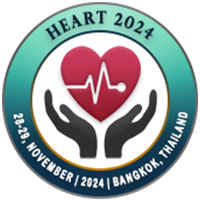Track:
Sub-Track:
Scientific Highlights
- Cardiovascular Diseases
- Heart Diagnosis
- Cardiac and Cardiovascular Research
- Heart Devices
- Cardiovascular Diabetology, Obesity & Stroke
- Interventional Cardiology
- Nuclear Cardiology, Molecular Cardiology, Cardio-Oncology
- Pediatric Cardiology & Womens Cardiology
- Cardiac Nursing Care
- Heart Regeneration
- Cardiac Pharmacology
- Cardiac Diet/Cardiac Nutrition
- Cardiovascular Impact of COVID-19
- Current Research and Advances in Cardiology & Case Reports on Cardiology
- Cardiology - Future Medicine
- Sports Cardiology
- Echocardiology and Valvular Diseases
- Cardiothoracic Surgery
- Fetal Cardiology
- Cardiac Imaging
- Dyslipidemia and Risk factors
- Cardiac Arrhythmias
- Transplantation: Heart and Lungs
- Cardiomyopathies
- Cardiac Surgery

